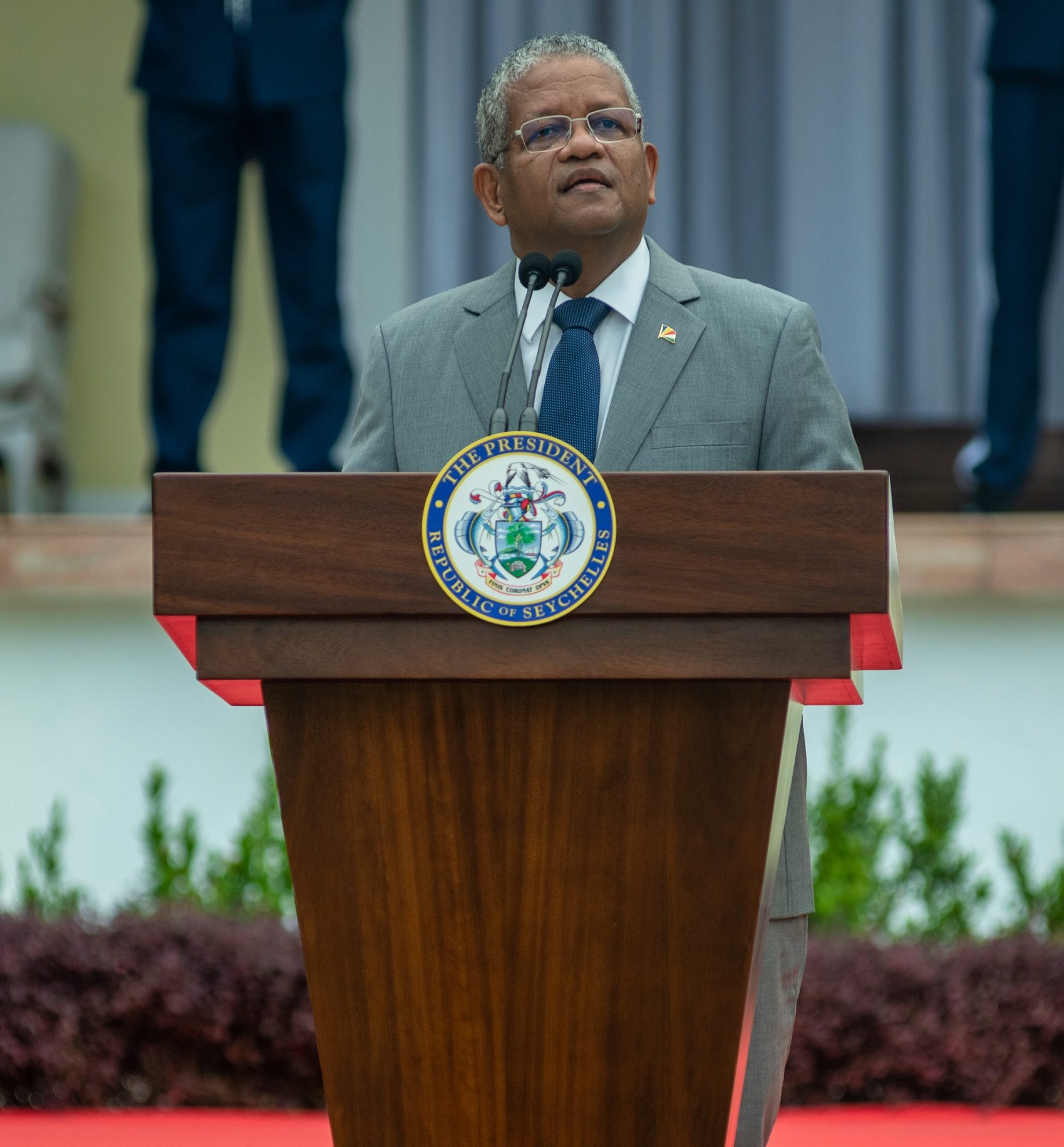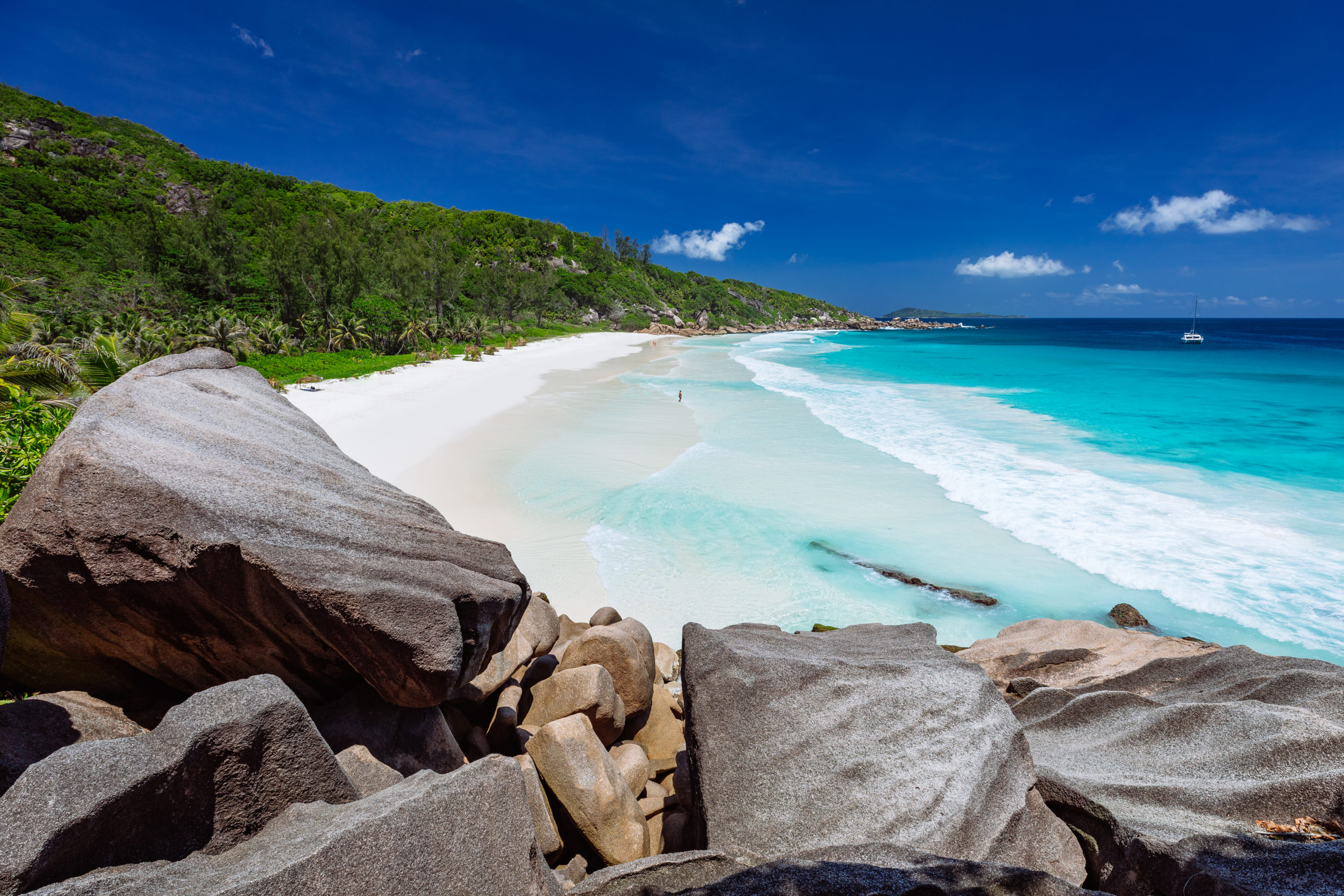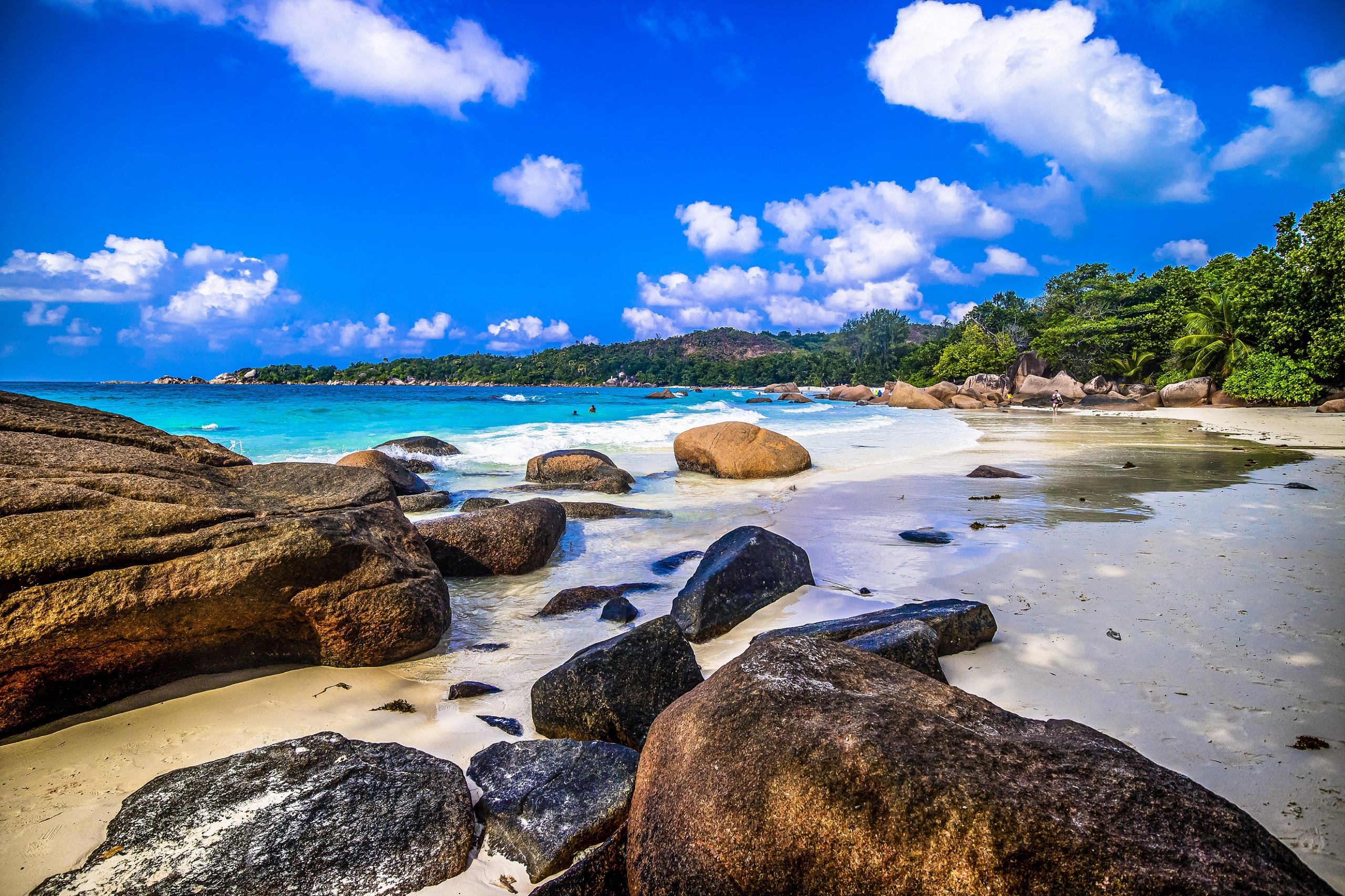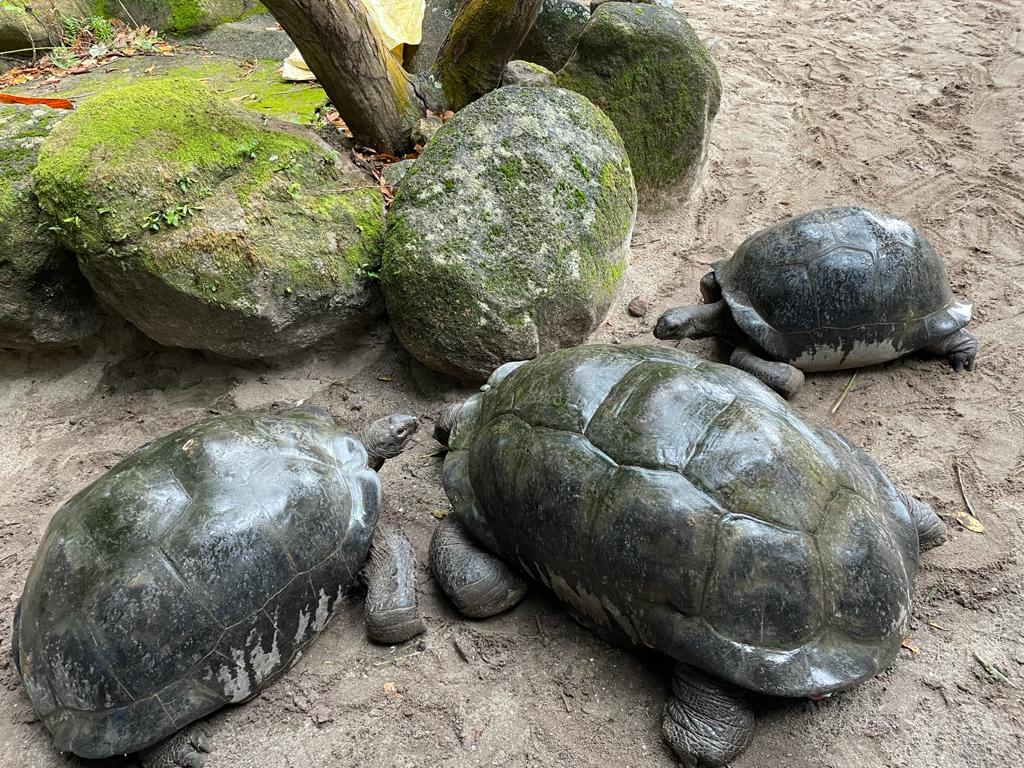Eight months into his ascent to the presidency to the Republic of Seychelles, priest-turned-politician Wavel Ramkalawan sees a large role on the world stage for his tiny nation. The 115-island archipelago in the Indian Ocean, said by some to be the original site of the biblical Garden of Eden, has its share of non-Eden-like problems ranging from drugs to the economy to COVID-19. Yet, President Ramkalawan seems resolute in his belief that his country is uniquely suited to play the role of honest broker, negotiating international disputes as it addresses those issues that confront its domestic agenda. A mere 45 years into independence, the president himself is a tribute to Seychelles-style democracy, having served as opposition leader through six attempts to reach the presidency.
Often linked as the two countries outperforming others in the fight against COVID-19, the Seychellois and Israeli tourist industries anticipate building upon this pairing.
President Wavel Ramkalawan hosted The Media Line’s Felice Friedson at State House, the seat of government, on the eve of Seychelles’ 45th National Day, its celebration of independence.

The Media Line’s Felice Friedson meets with President Wavel Ramkalawan at State House, Victoria, Mahé, Seychelles. (State House)
TML: President Ramkalawan, thank you so much for taking the time with me at The Media Line. Your country is quite magnificent, and it’s nice to have this opportunity early on into your presidency.
President Ramkalawan: Thank you very much for coming to State House and taking time off your break; your holiday.
TML: My pleasure! From ordained minister to president of one of the smallest but intensely beautiful countries in the world, how has your country changed since it became independent in June of 1976?
President Ramkalawan: Well, I must say it was only joy and celebration when we became an independent state. Well, tomorrow will be 45 years, in fact, as we celebrate independence. There’s been a lot of change. For example, the landscape of the country, with [the] various reclamations that have been done for us to be able to accommodate, for example, an airport, a port, and other places for industrial development. Housing – there’s been a lot of housing buildings, but at the same time, I think that it was unfortunate that soon after independence, 11 months after independence, in fact, there was a coup. This changed things a bit.
It weakened our democracy, and there were quite a bit of human rights abuses. Many of our people had to go into exile, and this sort of changed the easygoing mentality of our people [and] the kindness, because suddenly everybody started fearing his neighbor, so this has been a sort of disadvantage, I would say. As far as economic growth, the launching of the tourism industry, receiving investors and pushing our tourism industry to become well, sort of, top end to receiving plans, 5-star hotels and everything. … But I would say, all in all, it’s been a good 45 years, but now we have to think seriously about not only the next five years but about the next 45 years. How we get our people to be hard-working and to take care of themselves.
TML: You mentioned there was corruption. You mentioned that there were problems within the government. It took you six times as head of the opposition to finally become the president. How do you shift that dynamic?
President Ramkalawan: Well, I can say it’s very difficult because one of the things that I am finding is whereas my policy and the ticket on which I was elected was “Seychelles: A Place for All the Children,” this was basically to put emphasis on reconciliation. To reconcile our people and to get rid of what brought about the divisions. I got 55% of the vote. Everybody was happy and everything else, but what I’m finding difficult is, as I’m putting into practice the very slogan and the principles that we campaigned on, even [from] my supporters who are saying, “No, no, no, we should get rid of all of those who formed part of the previous government,” so this is one of the big challenges.
I would say that right now, instead of going towards unity, which I am putting a lot of emphasis on, and I declare that every Seychellois is a friend of mine. Whoever criticized me in the past, or people who had political arguments against [me] and everything else, I am saying, “Look, we are all part of Seychelles, and in fact, it was with this attitude that we manage to undergo a very small transition.
The former president, Danny Faure, and myself, being of the same age, we put emphasis on Seychelles. In fact, only this morning we attended a funeral together and we were seated next to each other, and we talked about a number of things. So, the theme of unity, and especially at this point in time, when the country is faced with COVID[-19], where everybody should be pulling in the same character, unfortunately, I feel that the opposition is not doing that. I would expect them to say, “Look, this is about survival. Let’s come together, sort out the issues, and then we’ll get back to whatever politics we want.” But it’s not happening as such. We are then looking at everything else that this country needs.
I’ve been seeing how we not only put emphasis on the tourism industry, [but also] how we diversify putting emphasis on fisheries, on agriculture, on the financial services, and going into any area where we feel we can invest in order to give the best possibility.

Seychelles President Wavel Ramkalawan speaks at on National Day at State House, Victoria, Mahé, Seychelles, June 29, 2021. (State House)
TML: I’d like to elaborate on that particular point because Seychelles is really one of the best-kept secrets in the world, and you are known for rain forests and granite and coral reefs. What is Seychelles not known for?
President Ramkalawan: Well, I would say that’s a very difficult question, because we always portray ourselves as 1,000 miles from anywhere, a paradise in the middle of the ocean, but I would say the people. I would say it’s about discovering the people, and unfortunately, even as we sell ourselves, we sort of kept the tourists away from our ordinary way of living. For example, a tourist coming to Seychelles is [coming for] sand, sea, and sun, but what about going into the villages to get a sense of the hospitality, to get a sense of how our people live, and how they raise their children? You will find that there’s a lot of love there. There’s a lot of love, and maybe some of the things that the West has lost – the family. Seeing a grandchild being taken care of by the grandmother. Seeing children coming back home and showing respect, so it’s the way of living of our people that maybe we should [focus on] as we’re going towards more cultural tourism, to allow tourists to enter into that area, and not only thinking of going to the beach and having a great time and going back [home] to say I’ve been to Seychelles. The people, the culture; this we need to enhance.
TML: There are magnificent flowers, birds, [and] incredible spices. These are some of the things that I have witnessed and seen that many aren’t aware of. What prevents it from getting the branding it deserves?
President Ramkalawan: I like what you just said, and I can tell you that under this new administration, for example, we’ve gone back to harvesting cinnamon, and right now there are a number of private individuals who will not only be doing the traditional [sticks], and preparing the little bits that you put in your cooking and stuff but also producing cinnamon oil. … In the early days of Coca-Cola, the cinnamon that they used came from Seychelles, but then we lost the market because we said no, we have to stop exploiting cinnamon. Now we are going back to cinnamon oil, and this definitely will have an impact on [things].
I mean, you enter any spa, and the first smell that catches your senses is that of cinnamon. So, we are going back to cinnamon. We are going back to vanilla. Again, we are looking at what the price of vanilla is on the world market. I don’t know if you visited La Digue, but La Digue at L’Union Estate [Farm], was one of the biggest vanilla farms, so we’re going back to vanilla.
We produce vanilla tea, but it looks as if all of these things have gone down, and so we have a lot of challenges. Early on, when we were talking, you mentioned the tea tavern, the beautiful view. This will be another beautiful place. We want tourists. We not only want tourists, but we want our people to appreciate what they have around us, and as a tropical country – when you live in a tropical country – it’s the colors, [and] the birds, but I must also say that we are doing quite a bit in terms of environmental protection.
We have a number of endemic birds, and over the years we’ve seen an increase in their population. Some are moving out of danger. We are doing all of this. At the same time, we, unfortunately, have foreigners who come and exploit our fauna and our flora, for example, the giant geckos that are found only on the island of Praslin. We’ve had people illegally taking them out of the country and this is an endemic species and they are earning millions for those. So, whilst we portray ourselves and ask people to come and admire, at the same time we have to be very careful of poachers amongst the tourists who come to our shores.

Petite Anse beach on La Digue, Seychelles. (Torsten Dickmann/Seychelles Tourism Board)
TML: Over 61% of your population has been vaccinated, and Seychelles made headlines as the most vaccinated country in the world. A recent surge in COVID[-19] cases has questioned the efficiency of the Chinese Sinopharm vaccine. What light can you shed on this?
President Ramkalawan: Well, I think there’s been vaccination politics with the West versus China, but unfortunately Seychelles got stuck in between the vaccination politics. The one thing that I will say: The Sinopharm vaccine saved our country. What proof do I have to say that? Well, simple, the deaths that have been recorded have not been of those fully vaccinated with the Sinopharm vaccine. In fact, it’s been mostly elderly people who have died, but not directly from COVID[-19], but with other medical conditions, but they were positive [for COVID-19]. They took Covishield, [the Indian-made version of the] AstraZeneca vaccine.
As far as hospitalizations are concerned, the percentage of people who are vaccinated is only 20 to 30%. Most of the others are unvaccinated. Most of the people who have contracted the virus, after being vaccinated, have had mild symptoms, or have been asymptomatic. So, yes, the vaccine has helped us, and it’s just like other vaccines. The question now is whether vaccines that have been made in the traditional way, [such as] Johnson & Johnson, Covishield, Astra Zeneca, [and] Sputnik V, whether these vaccines will be able to protect us against the new variants. This is something that science is working on, and we’ll cross that bridge when we get there. A third dose of Sinopharm and what effects it will have? All of these are questions that we are asking ourselves, but we are satisfied with the vaccination program.
TML: When tourists are looking to come to a destination, and they see a red flag. It says No. 4, red flag. How do you handle that? Is it misinformation, or is it accurate?
President Ramkalawan: Well, you see because of our size, our size is both an advantage as well as a disadvantage. We were first, as far as vaccination is concerned, in the world, because of our size. We had to vaccinate 70,000 people and that gave us the #1 position, but at the same time, when we have 100 cases, this also puts us way up there. So, the message that I have for tourists is very simple. Seychelles is safe. We do not have people dying on the streets.
The number of people who are coming into the country and who have tested positive [for COVID-19] is an absolute minority. I mean, less than 50 tourists. We don’t know now whether they came with the virus and then it manifested itself or what, because also there are people who come in with fake PCR tests.
The number of deaths – we’ve had 63 deaths, but that’s out of 13,000 people who have tested positive, so again, it’s an absolute minority. And of those who have tested positive, the majority have recovered, and those who have been vaccinated who have died, we’ve had only four cases. So again, it’s just a small minority. An absolute minority.

Praslin Island, Seychelles. (Wirestock)
TML: In terms of medical care, and since of course, it’s a small country, what other countries do you partner with in order to get certain operations, if God forbid, there are certain people who need transplants and things that happen on a daily basis.
President Ramkalawan: As far as COVID[-19] is concerned, up until now we’ve been able to deal with all of the cases, and our health services are not overwhelmed right now, so we’ve been able to handle everyone who has had COVID[-19]. The recovery rate, and some people were very sick, have been taken care of, and they are back home now.
I had a gentleman who was 94 years old. He had received only one dose of Covishield, and he got the virus and everybody was scared for him, but the gentleman is back home. He is singing. He’s entertaining his family. Bless him. As far as COVID[-19] is concerned, everything is under control. The health services are not overwhelmed, and for any tourist, I would say to them, when you come to Seychelles, if you need the treatment, if you need hospitalization, you will get it, and it’s a high-quality service. So, we’re OK as far as this is concerned, but generally, for medical services, we cannot provide here in Seychelles.
For the Seychellois locals, the government takes care of overseas treatment, and mainly more people have been going to the UAE, to Sri Lanka, and to India. These are the three main countries with which we have cooperation. Then, of course, the children with heart conditions, it has been the island of Réunion, which is a part of France.
TML: Your African nation has brought alliances and interesting connections geopolitically: India, China, [and] the Emirates. Since you have ascended to the presidency, have you had any problem juggling the alliances?
President Ramkalawan: No! In fact, the policy of Seychelles is in fact very simple. We are friends to everybody. If they have their problems, we say to them, “Look, when you are here, we are all friends.” Earlier this year, I had the honor of taking a group of diplomats to the atoll of Aldabra, and this included the Chinese ambassador, the Indian high commissioner, and the Russian ambassador. There was also the French ambassador, and also the British chargé [d’affaires]. And there was the Sri Lankan chargé as well.
We had a couple of good days [together], and there was nothing about geo-politics and all of these discussions. In fact, it was interesting. For you to go to the atoll of Aldabra, you’ve got to land on the island of Assumption. Assumption Island was in the middle of all of this debate about India wanting a base [there], and people played China against India. But the Chinese ambassador, and the Indian high commissioner enjoyed the island, so when you’re in Seychelles this is in fact something else where we could promote ourselves.
Seychelles should become a place where warring parties come to iron out their differences and I’m ready to play the role of negotiator. So, please, when you have problems in Israel and they are fighting about who is going to become prime minister, tell them to come to Seychelles and we’ll welcome them with open arms and we’ll iron out those issues.
I’m not in the middle of any conflict. Only on [this past] Friday I was at the Chinese Embassy celebrating the establishment of diplomatic relations with Seychelles, and the Indian high commissioner was there, so no problems there.

Aldabra giant tortoises. (Felice Friedson/The Media Line)
TML: President Ramkalawan, it’s a small country. Some people don’t understand where the nation’s hold on the world emanates from, assuming that countries with larger numbers have more say; but that isn’t necessarily the case. Seychelles has a vote in the UN as any other country. What other examples like that can you think of, where Seychelles, too, has a seat at the table?
President Ramkalawan: Well, we’ve used all of the possibilities that have come our way, and we’ve always been a country that’s made its voice heard when in fact tomorrow I’ll be leaving to attend the Austria Summit chaired by the president and Arnold Schwarzenegger. At that summit, which is talking about a healthy planet, a healthy style of living, I will be putting forward our position as far as the environment is concerned. In fact, just before I came for the interview, I was saying to the vice president [that] I want to say to our friends in Austria, where you have snow, and a little further north [than that] you have the North Pole and glaciers that are melting, I want to say to them, we don’t have snow, we don’t have glaciers, but guess what? When your glaciers melt, we are affected.
We are an archipelago of 115 islands, and if you, the West, don’t do anything about the warming of the planet and everything else, we will soon not be an archipelago of 115 islands, and my home, which today overlooks the port, well when my great-great-great grandchildren are there, will probably be the port.
Seychelles will stand strong. We will be attending COP 26 [UN Climate Change Conference in Glasgow, Scotland scheduled for November 2021]. Again, as far as the environment is concerned, we will be speaking out in a loud voice, and we’ll be telling the West and especially the world, listen to what we have to say. So, rest assured that whichever occasion we have, we make our voices heard, and on the African continent, we are an example as far as democracy is concerned, and we are pushing that even further to ensure that there is freedom of expression, [and] human rights are respected.
So, Seychelles should in fact become a world model, not only a regional or continental model, but a world model, and we’re pushing in all directions.

Ceremony marking National Day at State House, Victoria, Mahé, Seychelles, June 29, 2021. (State House)
TML: You fill an interesting role, and people don’t expect a lot from politicians, but they do from priests. My question is what can the priest do that the politician can’t?
President Ramkalawan: Well, I think that the priest in me shows compassion, shows understanding. It’s about reconciling with other people, which I believe in. It’s about establishing peace, which again, is another value which I am fondly attached to. It’s about caring for the people, and caring, not only to get a vote, but caring because you have another human being you’re dealing with and that other human being is similar to you. You are created in the image of the same God, so I think that it’s this heart of compassion that maybe is sometimes lacking in politicians, because they are thinking of only a vote.
And here may I say that the only real reason why I kept coming back, and I never turned to violence even when I felt that I had been cheated at elections, is simply because I believe in the principles I stand for. Today, my presidency is only about trying to put those principles into practice, and attaching myself to power is definitely not my priority.
I said to everybody who works around me [and] who works with me, that I only work here, and after five years I may not be working here. When that time comes, I will take my bag and a couple of things that I have and I will go. I also say that if there is anybody who is thinking of violence, please don’t kill me. Just tell me. Give me advance warning and I’ll go. So, the priest in me is No. 1. I’m first and foremost a priest, a man of God, and secondly, a politician, and I want to keep it that way.
I can tell you, Felice, that I’m still a practicing minister, and I still lead funerals. I still preach. Holding the hand of a dying person and saying a prayer, is where I find my peace, and not standing up on a stage telling people to vote for me. That’s not where I get my peace.
TML: President Ramkalawan, thank you very much for your time, and for shedding light on your very beautiful country!
President Ramkalawan: Thank you very much, Felice, and enjoy the rest of your stay. I’m sure our paths we’ll cross again, and I look forward to welcoming you back to Seychelles and for you to continue enjoying the country, and I hope that when you next come, you’ll be able to have a beautiful cup of vanilla tea while you are enjoying the beautiful sunset.